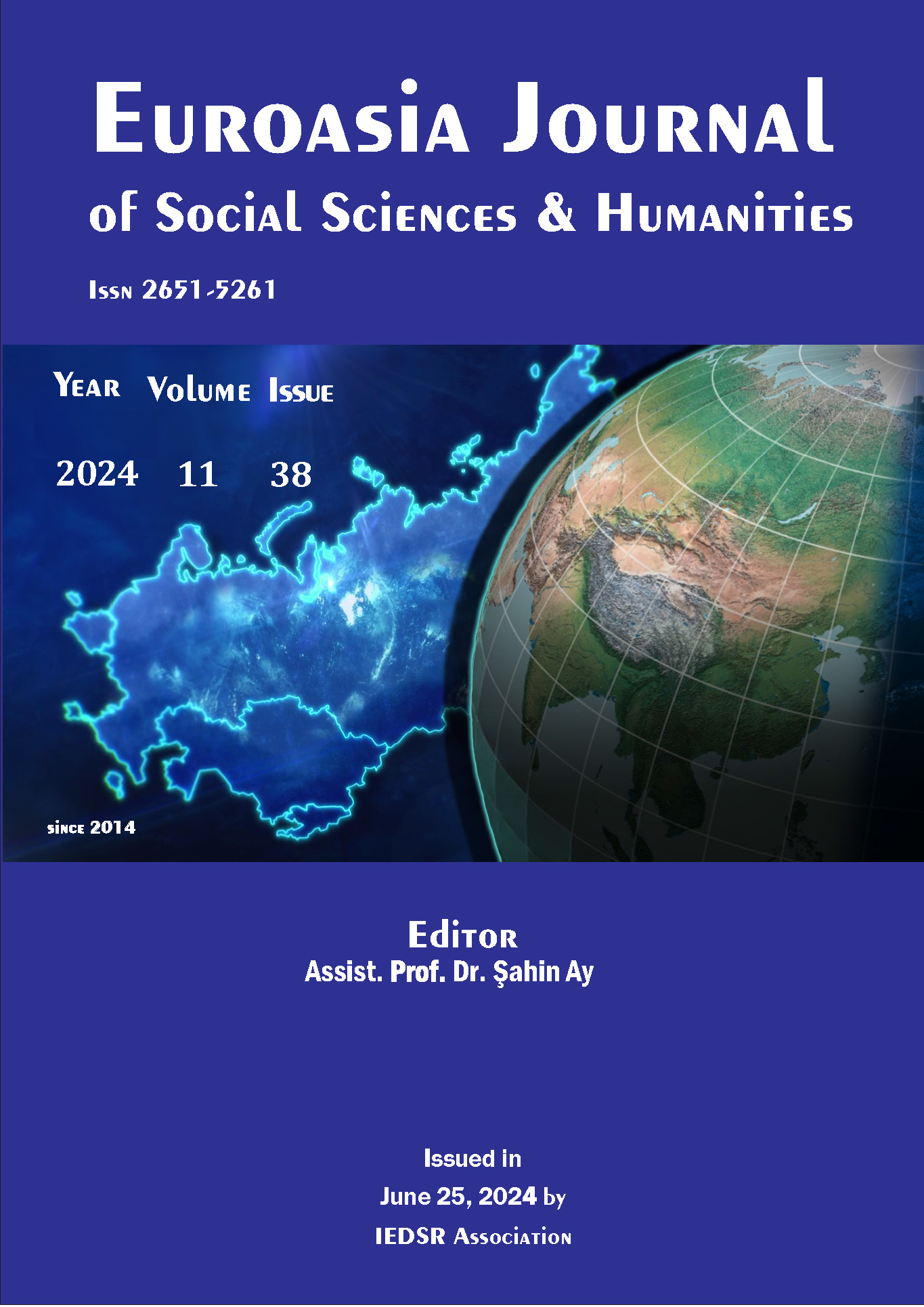The Mediating Role of Psychological Flexibility in the Relationship Between Social Media Addiction and Emotional Eating
DOI:
https://doi.org/10.5281/zenodo.12699832Keywords:
Social Media Addiction, Emotional Eating, Psychological FlexibilityAbstract
The aim of this study is to investigate and examine the mediating role of psychological flexibility in the relationship between social media addiction and emotional eating behaviors in adult individuals. This study utilized a quantitative research method, specifically the correlational survey method, which is one of the general survey methods. The population of this study consists of a total of 384 adult individuals aged 18 and over. In this research, a Sociodemographic Information Form, Social Media Addiction Scale - Adult Form, Turkish Emotional Eating Scale, and Psychological Flexibility Scale were used. It was found that there is a negative relationship between participants' levels of social media addiction and psychological flexibility, a positive relationship between participants' social media addiction and emotional eating levels, and a negative relationship between participants' emotional eating levels and psychological flexibility levels. Additionally, it was determined that participants' social media addiction scores significantly predict emotional eating scores, and psychological flexibility scores also significantly predict emotional eating scores. However, it was found that psychological flexibility scores did not have a mediating effect between social media addiction and emotional eating. Considering the positive relationship between social media addiction and emotional eating levels revealed in the analysis of this study, clinicians can focus on creating awareness to help individuals balance their social media usage during the therapeutic support process.
Downloads
References
Alpaslan, M. (2014). İnternet Aile Stillerine Göre 9. Sınıf Öğrencilerinin İnternete Yönelik Tutum, Öz Yeterlik ve İnternet Kullanım Amaçlarının İncelenmesi. Yüksek Lisans Tezi, T.C. Sakarya Üniversitesi Eğitim Bilimleri Enstitüsü Bilgisayar ve Öğretim Teknolojileri Eğitimi Ana Bilim Dalı.
Ağaca Özger, İ. (2012). Fazla kilolu ve obez bireylerde duygu değişiklikleri ve yeme eğilimi ilişkisinin değerlendirilmesi (Master's thesis, Sağlık Bilimleri Enstitüsü).
Bay, G. Ö. (2022). Yakın Doğu Üniversitesi Lisansüstü Eğitim Enstitüsü Klinik Psikoloji Anabilim Dalı.
Bekker, M. H., Van De Meerendonk, C., ve Mollerus, J. (2004). Effects of negative mood induction and impulsivity on self‐perceived emotional eating. International Journal of Eating Disorders, 36(4), 461-469.
Babacan, M. (2019). 24 Haziran 2018" Cumhurbaşkanlığı Hükümet Sistemi" seçimlerinde başkan adaylarının sosyal medya kullanım pratikleri: Twitter örneği (Master's thesis, İnönü Üniversitesi).
Bilgen, Ş. S. (2018). Türkçe duygusal yeme ölçeği geliştirilmesi, geçerlilik ve güvenirliği çalışması. Yüksek Lisans Tezi. Üsküdar Üniversitesi.
Büyüköztürk, Ş. (2018). Data analysis book for social sciences. Pegem Ciatation Index.
Cansiz, S. (2019). Üniversite öğrencilerinde sosyal medya bağımlılığı ve duygusal yeme arasındaki ilişkinin incelenmesi (Master's thesis, Sosyal Bilimler Enstitüsü).
Chou, W. P., Yen, C. F., & Liu, T. L. (2018). Predicting effects of psychological inflexibility/experiential avoidance and stress coping strategies for internet addiction, significant depression, and suicidality in college students: a prospective study. International journal of environmental research and public health, 15(4), 788.
Çiftçi, H. (2018). Üniversite Öğrencilerinde Sosyal Medya Bağımlılığı. Manas Sosyal Araştırmalar Dergisi, 7(4).
Dawson, B. D., & Trapp, R. G. (2001). Reading the medical literature: Basic & Clinical Biostatistics. Lange Medical Book. McGraw–Hill. Medical Publication Division, New York, 3, 7-9.
Güney, M., & Taştepe, T. (2020). Ergenlerde Sosyal Medya Kullanımı ve Sosyal Medya Bağımlılığı. Ankara Sağlık Bilimleri Dergisi, 9(2), 183-190.
Hayes, S. C., Luoma, J. B., Bond, Masuda, F. W. A. ve Lillis, J. (2006). Acceptance and Commitment Therapy: Model, processes and outcomes. Behaviour Research and Therapy, 44(1):1-25.
Hou, Y., Xiong, D., Jiang, T., Song, L., & Wang, Q. (2019). Social media addiction: Its impact, mediation, and intervention. Cyberpsychology: Journal of psychosocial research on cyberspace, 13(1).
Karakuş, S., & Akbay, S. E. (2020). Psikolojik esneklik ölçeği: Uyarlama, geçerlik ve güvenirlik çalışması. Mersin Üniversitesi Eğitim Fakültesi Dergisi, 16(1), 32-43.
Keskin, H., Baştuğ, M., & Akyol, H. (2013). Sesli okuma ve konuşma prozodisi: ilişkisel bir çalışma. Mersin Üniversitesi Eğitim Fakültesi Dergisi, 9(2), 168-180.
Kashdan, T. B., & Rottenberg, J. (2010). Psychological flexibility as a fundamental aspect of health. Clinical Psychology Review, 30(7), 865-878.
Özdemir, G. S. (2015). Duygusal yemenin depresyon, anksiyete ve stres belirtileri ile olan ilişkisi. Yayımlanmamış Yüksek Lisans Tezi. Gaziantep: Hasan Kalyoncu Üniversitesi, Sosyal Bilimler Enstitüsü.
Özdemir, Z. (2019). Üniversite Öğrencilerinde Sosyal Medya Bağımlılığı. Beykoz Akademi Dergisi, 7(2), 91-105.
Sağar, M. E. (2019). Yetişkin Bireylerde Sosyal Medya Bağımlılığının İrdelenmesi. Sağlık Bilimlerinde Eğitim Dergisi, 2(1), 29-42.
Sağar, M. E. (2022). Yetişkinlerde Sosyal Medya Bağımlılığının Yordayıcısı Olarak Psikolojik Esneklik ve Problem Çözme Becerileri. Mehmet Akif Ersoy Üniversitesi Sosyal Bilimler Enstitüsü Dergisi, (35), 179-192.
Seslikaya, C., & Arslan, S. (2023). The effect of social media use on emotional eating in women aged 19-45. Journal of Health Sciences and Medicine, 6(2), 394-400.
Şahin, C., & Yağcı, M. (2017). Sosyal medya bağimliliği ölçeği-yetişkin formu: geçerlilik ve güvenirlik çalişmasi. Ahi Evran Üniversitesi Kırşehir Eğitim Fakültesi Dergisi, 18(1), 523-538.
Şeker, V. T. (2018). Sosyal Medya Bağımlılığı İle Depresyon Ve Anksiyete Arasındaki İlişki (Master's Thesis, Sosyal Bilimler Enstitüsü).
Uyar, S., & Özen, M. Y. (2023). Gelişmeleri Kaçırma Korkusu (Fomo) ve Sosyal Medya Bağımlılığı İlişkisi: Meta Analiz. Gümüşhane Üniversitesi Sağlık Bilimleri Dergisi, 12(3), 1428-1436.
Van Strien, T. (2018). Causes of emotional eating and matched treatment of obesity. Current diabetes reports, 18, 1-8.
Downloads
Published
How to Cite
Issue
Section
License
Copyright (c) 2024 EUROASIA JOURNAL OF SOCIAL SCIENCES & HUMANITIES

This work is licensed under a Creative Commons Attribution-NonCommercial 4.0 International License.

